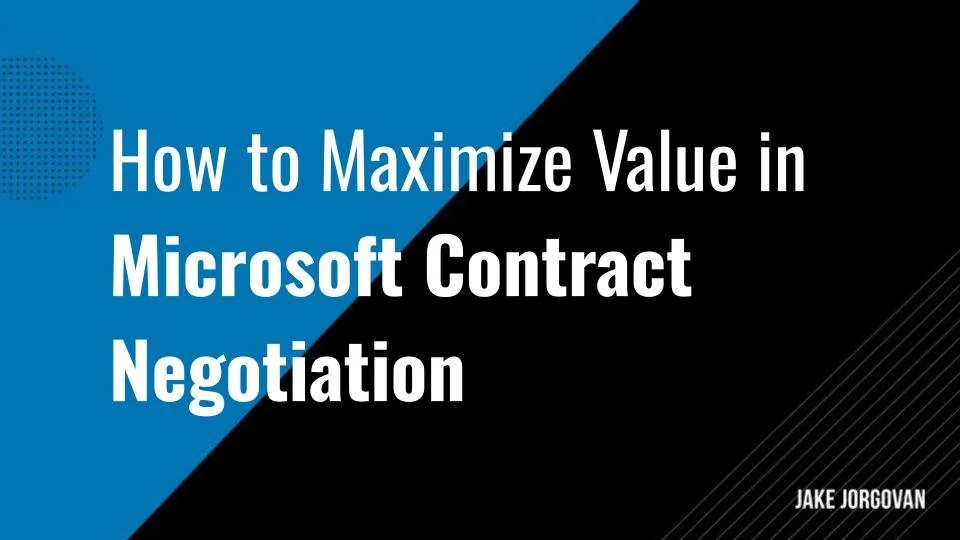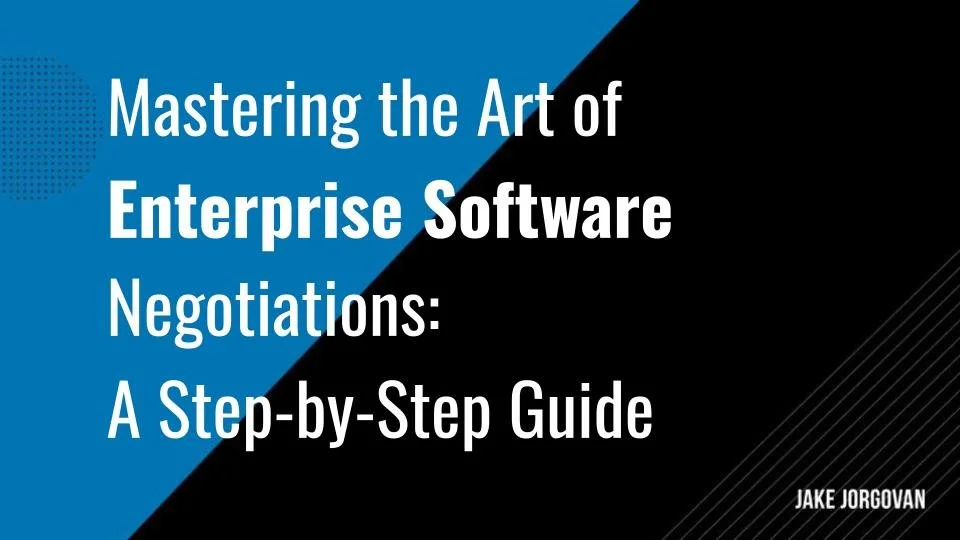5 Steps for Building an Enterprise Contract Negotiation Team that Finds Cost Savings
Saving costs in enterprise contracts is vital for financial success, and building the right negotiation team is the key.
This team needs specialized skills and a strategic approach. For example, automation alone can reduce administrative costs associated with contracts by 25-30%.
In this article, we'll outline 5 essential steps to create your ideal negotiation team.
Each step targets specific areas for maximum impact. These insights will help you find significant cost savings.
So, let's dive into the process and transform your negotiations.
How the Right Enterprise Contract Negotiation Team Can Find Cost Savings
The right enterprise software contract negotiation team is essential for identifying cost savings. Each team member brings specialized knowledge, which is crucial for uncovering hidden costs and scrutinizing all contract aspects.
Here’s how that works:
Financial experts analyze pricing structures. They identify areas where costs can be reduced. They also assess the long-term financial impact of the contract.
Legal experts review terms and conditions. They ensure compliance and protect against unfavorable clauses, preventing costly legal issues in the future. Organizations that regularly review and renegotiate contracts can achieve savings of up to 15% of contract spend.
IT specialists evaluate technical requirements. They inspect the software to make sure it meets your needs without unnecessary features. This prevents overspending on superfluous functionalities.
Procurement professionals bring negotiation skills. They use their experience to secure better terms. Their market insights help benchmark against industry standards.
Having a cross-functional team means diverse perspectives. This kind of in-depth approach is vital for thorough contract evaluation. Each member’s input is critical for a well-rounded assessment since it leads to informed decisions that drive cost efficiency.
Pro tip: Regular communication within the team ensures coordination. Updates on negotiation progress keep everyone aligned. This alignment is key for maintaining a focused strategy since it helps the team work towards common goals without duplication of efforts.
5 Steps for Building Your Enterprise Contract Negotiation Team
If you need the right team, here are the best 5 steps to building it:
Step 1) Identify and Select Diverse Team Members with Complementary Skills and Expertise
A successful negotiation team needs a diverse range of skills, like those shown in the graphic below.
Building a strong team for enterprise software contract negotiation starts with selecting members who bring diverse, powerful negotiation skills and perspectives. This diversity is crucial to addressing contract negotiations' complex, multifaceted nature.
To identify and select the right team members, your first step should be to identify the specific skills needed, such as legal expertise, financial acumen, technical knowledge, and negotiation proficiency. This allows each aspect of the negotiation to be covered.
Then, evaluate your existing team members to see who possesses these skills. Look beyond job titles and focus on individual strengths and experiences. If your internal team lacks certain skills, consider bringing in external consultants or temporary team members with the necessary expertise.
Ensure that team members' skills complement each other, creating a well-rounded team. A balance of technical, legal, and business insights is essential. Diverse teams are 70% more likely to capture new markets, highlighting the importance of varied perspectives.
And don’t forget soft skills — such as communication, teamwork, and problem-solving abilities. These are critical for effective collaboration and decision-making during negotiations.
Insider Tip:
We recommend using a skills matrix to visualize and assess your team's strengths and gaps. This tool helps align team capabilities and negotiation styles with negotiation requirements and makes it easier to pinpoint areas needing reinforcement.
Step 2) Establish Clear Roles and Responsibilities for Each Team Member
An effective negotiation process involves many roles, and your team should reflect this. Check out the following video for more information on roles in negotiation:
Clearly defining roles and responsibilities within your team is essential for a seamless negotiation process. It ensures everyone knows their tasks, which enhances efficiency and accountability. Research from Effectory shows that employees who experience role clarity are 53% more efficient and 27% more effective at work than those with role ambiguity.
Follow these steps to establish clear roles and responsibilities:
Identify key tasks: Break down the negotiation process into specific tasks, such as market analysis, drafting terms, and financial evaluation. This clarity helps in assigning roles effectively.
Assign primary roles: Match team members to primary roles based on their expertise. For example, legal experts can be assigned to handle contract terms, and financial analysts can be assigned to manage cost assessments.
Define secondary roles: Assign secondary roles for support tasks. This approach ensures no critical task is overlooked, and team members can assist each other when needed.
Clarify expectations: Communicate the expectations for each role clearly. Detail the scope of work, deadlines, and the level of detail required. The point is to prevent misunderstandings and set a standard for performance.
Document roles and responsibilities: Create a document that outlines each team member's roles and responsibilities. Share this document with the team and stakeholders to maintain transparency and accountability.
Step 3) Develop Strong Communication Channels
Effective communication is crucial in team-based contract negotiations. A strong communication plan keeps everyone aligned and aware of progress.
To establish strong communication channels, start by scheduling weekly or bi-weekly meetings to discuss progress, challenges, and next steps. These meetings provide a platform for real-time updates and collaborative problem-solving.
Implement tools like Slack, Microsoft Teams, or Asana for continuous communication and task management. These platforms centralize information, making it accessible to all team members. Notably, Microsoft Teams reached 320 million monthly active users in early 2024, highlighting its widespread adoption.
Next, establish a secure, centralized location for all relevant documents. Use cloud-based solutions like Google Drive or SharePoint for easy access and real-time collaboration. Establish clear guidelines for how and when to communicate. Specify the use of email for formal updates and messaging apps for quick queries. This prevents miscommunication and keeps everyone on the same page.
Finally, you should strive to promote an environment where team members feel comfortable sharing ideas and concerns. This openness leads to better problem identification and innovative solutions. Here are some ideas for how to create a more collaborative and open environment:
Step 4) Implement a Collaborative Decision-Making Process
Collaborative decision-making is vital in contract negotiations to access the full potential of your team's diverse expertise. Check out the graphic below for some key aspects of a collaborative decision-making model.
This approach ensures that decisions are well-rounded and consider multiple perspectives. Follow these steps to implement a collaborative decision-making process:
Define decision criteria: Establish clear criteria for decision-making. These criteria should align with your negotiation goals and priorities, such as cost, legal compliance, and technical feasibility.
Set up decision-making frameworks: Use frameworks like RACI (Responsible, Accountable, Consulted, Informed) or DACI (Driver, Approver, Contributor, Informed) to structure the decision-making process. These frameworks clarify roles and streamline the decision path. But beware — it's important to note that 80% of organizations report struggles with decision-making, and frameworks like RACI can sometimes make things worse if not implemented correctly.
Schedule regular decision checkpoints: Integrate regular decision checkpoints into your meeting schedule. These checkpoints provide structured opportunities to review progress, discuss issues, and make decisions.
Encourage diverse input: Actively solicit input from all team members, particularly those with specialized knowledge. This inclusivity helps you tap into the full breadth of your team's expertise.
Document decisions and rationale: Keep a detailed record of decisions made and the rationale behind them. This documentation supports transparency and provides a reference for future decisions.
Step 5) Provide Necessary Training and Resources to Enhance Negotiation Skills
Training and providing resources to build powerful negotiation skills are critical for your team's success. This investment prepares your team for various scenarios and equips them with the effective negotiation strategies and tools they need. Here's how to implement effective training and resource provision.
First, assess your team's current negotiation skills to pinpoint areas needing improvement. Use feedback from past negotiations and self-assessments to guide this process.
Develop or source training programs that address identified skill gaps. Focus on areas such as conflict resolution, persuasive communication, and strategic planning. The more targeted and specific, the better — companies with a systematic approach to sales and negotiation experience 42.7% greater growth to the bottom line than those without.
Once you know where to focus, bring in experienced negotiation trainers or consultants. Their expertise provides valuable insights and practical techniques that are immediately applicable.
Equip your team with negotiation templates, checklists, and reference materials. These tools aid in preparing for negotiations and maintaining consistency. This comprehensive guide from the Program on Negotiation at Harvard Law School helps you analyze your perspective and the other side's interests, goals, and power in any business negotiation.
It can greatly help to use simulations and role-plays. Use realistic simulated negotiation scenarios to practice skills. These exercises help team members apply their learning in a controlled environment and receive constructive feedback.
The graphic below contains a few ideas for negotiation-themed games you can implement to make the negotiation training process more engaging.
Common Mistakes When Building an Enterprise Contract Negotiation Team
Building the right enterprise contract negotiation team isn’t all sunshine and rainbows — it’s rife with challenges and potential problems. In the graphic and list below, you can see some of the most common mistakes you might encounter and how to solve them.
Failing to define roles clearly
Many teams struggle because members are unclear about their specific roles and responsibilities. This leads to overlapping duties, missed opportunities, and inefficient negotiations.
Solution: Start with a detailed framework for team roles, outlining who handles legal, financial, and vendor relations aspects. Ensure everyone knows their domain and put accountability metrics in place.
Lack of specialized expertise
A common mistake is relying on generalists rather than subject matter experts for complex negotiations. This often results in unfavorable contract terms or missed savings opportunities.
Solution: Incorporate experts with legal, procurement, and financial backgrounds into the team. Regularly upskill them on industry trends, compliance requirements, and negotiation tactics.
Ignoring data and analytics
Many teams fail to leverage data to benchmark pricing, evaluate vendor performance, or forecast savings opportunities. Without data, negotiations are based on guesswork.
Solution: Invest in contract management software that offers real-time analytics. Train the team to interpret data for insights that inform negotiation strategies.
Overlooking cross-functional collaboration
A siloed approach often limits a team’s effectiveness. When departments like finance, procurement, and legal operate in isolation, important details are missed.
Solution: Foster collaboration by creating a cross-functional team. Use collaborative tools for more seamless communication and hold regular updates to align goals.
Underestimating vendor relationship management
Some teams focus solely on cost-cutting during negotiations and neglect the importance of fostering long-term vendor relationships. This short-term mindset can lead to reduced quality and cooperation.
Solution: Balance cost-saving goals with a relationship-building approach. Develop a vendor management strategy that prioritizes mutual benefits and establishes trust.
Build an Effective Enterprise Contract Negotiation Team before Your Next Deal
Building an effective contract negotiation team is crucial for finding cost savings. That’s because each step we outlined here requires thoughtful execution and specialized expertise.
Investing in the right team can redefine your enterprise’s financial success.
The strategies we discussed above give you a comprehensive approach to boosting your negotiation power. Small, deliberate changes today can lead to substantial improvements in your future negotiations. The ultimate goal is to ensure your contracts are optimized for cost efficiency and strategic alignment.
So, follow the blueprint above to build a solid and cohesive negotiation team that finds cost savings and drives your enterprise toward financial success.
Frequently Asked Questions
What does a negotiation team do?
A negotiation team works collaboratively to secure favorable terms in contracts by leveraging diverse expertise in areas like legal compliance, financial analysis, and technical evaluation.
Who are the members of a negotiating team?
A negotiating team typically includes legal experts, financial analysts, technical specialists, procurement professionals, and a team lead to coordinate efforts.
How do you build a negotiation team?
Build a negotiation team by identifying the required skill sets, selecting members with complementary expertise, and defining clear roles and responsibilities to align with negotiation goals.
What is the role of the team lead in negotiations?
The team leader oversees the negotiation process, ensures coordination among members, and serves as the primary decision-maker and point of contact during discussions.
What is negotiation team building?
Negotiation team building involves assembling and training a group with the necessary skills, knowledge, and collaboration strategies to achieve successful contract outcomes.
What makes an effective negotiating team?
An effective negotiating team is diverse, well-trained, and aligned on goals, with members who bring complementary skills, communicate effectively, and collaborate seamlessly.




























